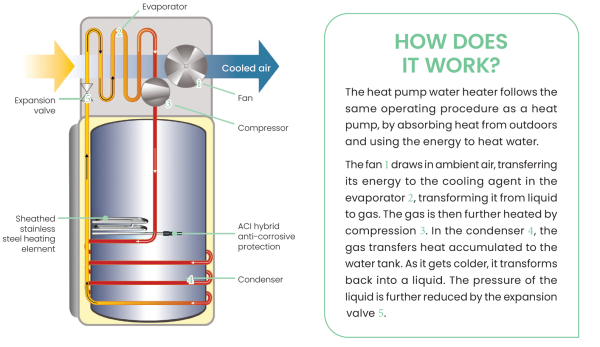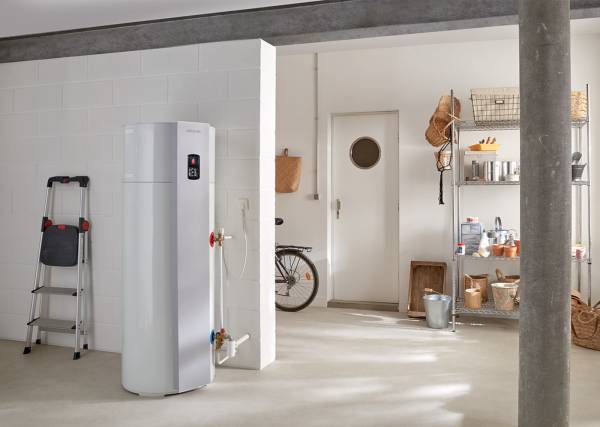Installation
Heat pump water heaters can be installed in houses or apartments, new constructions, or renovations. They can function in heated or unheated rooms, depending on the model and configuration.
- For apartments: Opt for models, such as the Calypso VM. Installation can take place in non-living areas like laundry rooms, hallways, or bathrooms.
- For houses: You have more flexibility with models like the Calypso, Explorer, or Egeo.
Placement Guidelines
Models that draw ambient air must be installed in an unheated room with a minimum temperature of 5°C and a volume of at least 20m³ to ensure optimal operation of the heat pump. Suitable locations include a laundry room, garage, basement, or pantry.
In contrast, outdoor air and split models are more flexible. These can be installed in either heated or unheated rooms with a year-round minimum temperature of 1°C, such as a garage, pantry, laundry room, entryway, or basement. The wall-mounted version of the Calypso ambient air model can even be installed in a kitchen or bathroom.
Ease of Use and Maintenance
Daily use of this equipment is straightforward as it functions similarly to a traditional water heater. Minimal maintenance is required, with a recommended inspection every two years.
Choosing the Right Capacity
At Atlantic, heat pump water heaters are available in the following capacities: 100L, 150L, 190L, 200L, 230L, 250L, 260L, and 270L. These options cater to a variety of needs, from households of two people to larger families with multiple water outlets (e.g., showers, sinks, and basins).
Advantages of Heat Pump Water Heaters
- Reduced Environmental Impact: Utilizes air as the primary energy source, eliminating the need for fossil fuels. This is why it is often considered an "eco-friendly" solution.
- Economical: Lowers energy consumption, resulting in reduced electricity bills.
- Reliable and Durable: Thanks to advanced anti-corrosion technology like ACI Hybrid.
- Comfortable: Provides hot water quickly, with intuitive digital controls. All Atlantic models also feature smart connectivity and intelligent functionalities.
- Energy Efficiency: Enhances the energy performance certificate (DPE) rating of your home. Use our DPE simulator to assess your home's energy rating.
Installation Recommendations
For the installation and maintenance of a heat pump water heater, it is essential to work with a professional. These devices are more technical than standard water heaters, and proper installation ensures long-term reliability.
We recommend contacting several professionals to compare quotes. Each installer should visit your home to provide a tailored estimate and guide you on any additional work that may be required.



